|
|
|
Sort Order |
|
|
|
Items / Page
|
|
|
|
|
|
|
| Srl | Item |
| 1 |
ID:
167692
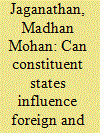

|
|
|
|
|
| Summary/Abstract |
The Indian state has undergone significant transformation since the late 1980s, most notably the extensive decentralisation of power, with consequences for the formation and implementation of Indian foreign policy. This article explores the role of India’s constituent states explaining the extent and limitations of their autonomy and influence. It deploys and extends the state transformation approach to incorporate considerations of issue area and coalition type. Under coalitions led by typical national parties, subnational governments are less likely to influence foreign and security policy. Under the same coalition type, they are more likely to behave autonomously on non-traditional security issues such as sharing of water resources with neighbouring countries. They are less likely to behave autonomously on security issues such as the transnational expression of ethnic solidarity. Under coalitions led by atypical national parties or regional parties, subnational governments are likely to exercise a moderate level of autonomy and influence on issue areas such as transnational expression of ethnic solidarity. They are likely to exercise a high level of autonomy and influence on non-traditional security issues such as sharing of water resources. The framework is illustrated through Tamil Nadu’s activism on Sri Lanka, and West Bengal’s position on water-sharing with Bangladesh.
|
|
|
|
|
|
|
|
|
|
|
|
|
|
|
|
| 2 |
ID:
133227
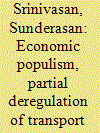

|
|
|
|
|
| Publication |
2014.
|
| Summary/Abstract |
The Indian political class is known to employ populist, albeit economically unsustainable, measures to replace intrinsic 'valence', especially shortly prior to election windows. Such measures include loan-waivers, interest rate concessions, provision of free electricity for agriculturists, etc. The union government's leverage to maneuver and to micro-manage retail fuel prices within partially deregulated environments is hypothesized to provide incumbents with an advantage over rival contestants in the electoral process. This paper analyzes the evolution in the retail prices of diesel and petrol (gasoline), and the transfer of such evolution, into the inflation index of the 'all commodity' basket. It is observed that when international benchmark prices are relatively low and domestic inflation is moderate, the transfer occurs within about 42 weeks. During periods of high oil prices-frequently above USD 100 a barrel-and high inflation-higher than 5.00-5.50%-prices of petroleum distillates tend to feed into overall inflation more rapidly, within about 34-40 weeks.
The study, covering a total of 82 elections for the central and state (provincial) governments during the period 2000 to 2013, concludes that even as patterns of manipulation of prices are apparent, ceteris paribus, such leverage does not necessarily seem to translate into favorable electoral outcomes. This conclusion reiterates observations that economic im/prudence may not necessarily determine electoral outcomes, and that the basis for electoral choices made by the Indian voter-consumer remains subjective.
|
|
|
|
|
|
|
|
|
|
|
|
|
|
|
|
| 3 |
ID:
151139
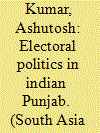

|
|
|
|
|
| Summary/Abstract |
The forthcoming Assembly elections in Punjab in early
2017 indicate signs of a new phase in the electoral history of this
state, largely dominated earlier by various political alliances headed
by the Shiromani Akali Dal (SAD) under Jat Sikh leadership.
Presented within the wider Indian electoral landscape, this article
offers an analytical overview of Punjab’s electoral politics as it has
evolved since partition from the vantage point of SAD. It is argued
that there are several good reasons why traditional SAD domination
and style of leadership are presently being challenged through a
combination of new political actors and, significantly, changing
awareness among a very diverse electorate about what to expect
from any government one elects.
|
|
|
|
|
|
|
|
|
|
|
|
|
|
|
|
| 4 |
ID:
105975
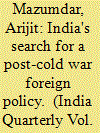

|
|
|
|
|
| Publication |
2011.
|
| Summary/Abstract |
During much of the Cold War, India chose to pursue a non-aligned foreign policy posture. The collapse of the Soviet Union and the end of the Cold War forced India to redefine its foreign policy and search for a new place in the emerging international order. However, almost 20 years on, India's foreign policy still appears to lack a coherent strategic doctrine. This article identifies some of the domestic factors that hampered the development of a post-Cold War 'grand strategy'. It argues that the emergence of coalition governments at the national level since the early 1990s, the country's federal structure, weaknesses in India's foreign policy institutions and the lack of a strategic culture within the country together constrain India's search for a post-Cold War foreign policy.
|
|
|
|
|
|
|
|
|
|
|
|
|
|
|
|
| 5 |
ID:
036837
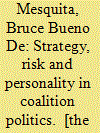

|
|
|
|
|
| Publication |
Cambridge, Cambride University press, 1975.
|
| Description |
ix,198p.
|
| Standard Number |
0521208742
|
|
|
|
|
|
|
|
|
|
|
|
Copies: C:1/I:0,R:0,Q:0
Circulation
| Accession# | Call# | Current Location | Status | Policy | Location |
| 028573 | 324.254/DDc 20 MES 028573 | Main | On Shelf | General | |
|
|
|
|
|
|
|
|
|